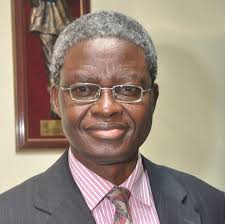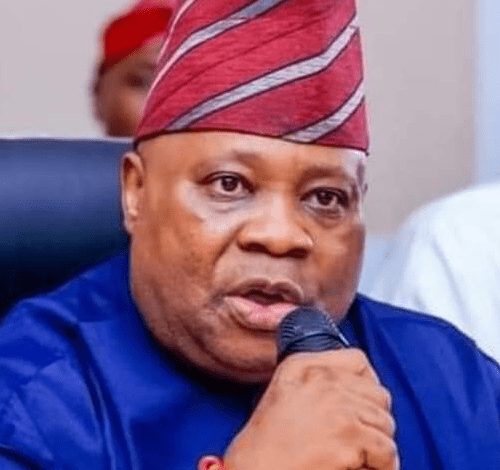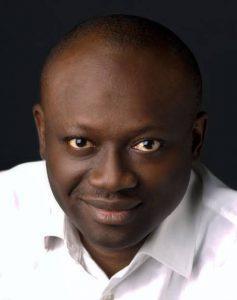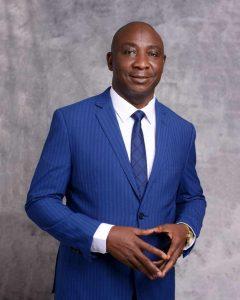Current developments are international only to the extent that they are perceived to be external to one’s own country. In other words, whatever happens outside of the national boundaries of a country is foreign or external or international. Put differently, what is considered to be domestic here in Nigeria is necessarily viewed as external in foreign countries. Still explained further, Nigeria is a foreign country to Senegal as Senegal is also a foreign country to Nigerians. Consequently, an international current development is both a domestic and an international act at the same time. The determinant of what makes a development international or domestic is the location of perception or determination.
In this regard, how does the Tinubu administration respond to the current developments in, and outside, of Nigeria? There are the many questions of international migration and refugees; international climate change and environmental pollution; renewal of recidivist inter-state international conflicts; democratisation of the United Nations system, enlargement of the UN Security Council, and the challenge of right of veto power; politics of nuclear non-proliferation; the unbelievably true Israelo-Hamas genocide; unending pandemics and the challenge of global health; deepening opposition to Westernisation in the conduct and management of international affairs; increasing disregard for human rights; policies of duplicity in the management of international questions; establishment of new international organisations as a counter-weight to the United Nations, such as the BRICS to which several countries are showing keen interest; international terrorism; unending threats to national territorial sovereignty; increasing calls for self-determination in several countries, and increasing gap between the rich and the poor, coupled with denial of justice and conscious impoverishment through foreign exploitation of natural resources of the developing countries. It is necessary to provide an exegesis of some of these developments in the context of Tinubuplomacy and challenges for Africa’s continental integration and future.
Current International Developments
Many of the current international developments have serious implications for Nigeria’s foreign policy. There is the ongoing Israeli-Palestinian conflict. One fundamental issue is that of recognition and position taking. Saudi Arabia reportedly made it clear to the United States that ‘there will be no diplomatic relations with Israel unless an independent Palestinian State is recognised on the 1967 borders with East Jerusalem as its capital’ (The Nation, Thursday, February 8, 2024, p.3). Two issues are involved here. This position is consistent with the popular international quest for a 2-State approach to the conflict. The problem, however, is the non-precision of where the borders begin and stop. Saudi Arabia, like many other Arab states, wants a return to the pre-6 Day War of 1967.
The problem again is that Nigeria is sharply divided over the conflict. The Nigerian Muslims generally tend towards the Arab Palestinians while the Nigerian Christians generally support the Israelis. The implication of the Israelo-Palestinian conflict is its potential to further the divide between the Muslims and Christians in Nigeria on the matter. History has shown that Nigeria has generally expressed sympathy for the Palestinians. It should be recalled that Nigeria allowed the Palestinians to open an Office in Lagos before the capital was moved on 12 December 1991 to Abuja.
Similarly, Nigeria not only supported Egypt in its fight against Israel, but also, in solidarity with Egypt, strained diplomatic ties with Israel. The pertinent question is this: were Nigeria’s policy positions consistent with Nigeria’s national interest? Nigeria’s non-alignment policy has made it clear that Nigeria’s foreign policy attitude shall be defined and determined by Nigeria’s national interest. In other words, what really is Nigeria’s policy stand on the conflict beyond simply supporting the 2-State suggestion? Israel has repeatedly shown non-preparedness to accept the option. Israel has said that it would wipe out the entire Hamas and has actually been doing just that. What does Nigeria’s national interest dictate in this case?
A second but related development is the issue of recognition of Israel raised by Saudi Arabia. The mere fact that Nigeria has a diplomatic mission in Israel clearly suggests that recognition is a non-issue for Nigeria. But has Nigeria recognised the State of Palestine? The answer can be yes as the Palestinian National Authority has a representation office in Abuja. There is nothing to suggest that Nigeria and the State of Palestine have exchanged diplomatic missions in its true sense of diplomatic accreditations. If this is so, why should it be so in light of the country’s foreign policy of non-alignment?
A third international development is the signing of the pact of l’Alliance des Etats du Sahel, AES (Alliance of Sahel States, ASS) by Burkina Faso, Mali, and Niger on 16 September, 2023. The agreement has the potential to be more destructive than progressive in the region and the whole of Africa. This is because there is nothing that can be easily done to remove the military juntas currently in power for two reasons: they have actually consolidated their power; they enjoy the active support of their people, they also enjoy the backing of some powerful big powers like Russia, and more importantly, their military forces also support them.

It was because of the increasing French military presence in Niger Republic that prompted the ‘Nigerien military backing the coup led by General Abdourahmane Tchiani’ against the President Bazoum administration, Professor Westcott of the University of London further argued. This simply means that any battle to be carried out and any diplomatic engagement to be envisaged must be done at the three levels of the military junta in power, the military institution backing the government, as well as the people also serving as the democratic backbone of the military junta and without ignoring the foreign policy interests of Russia and its allies.
Another international development that is at par with the issue of unconstitutional change of government in Africa is the postponement of elections by President Macky Sall in Senegal. Many public observers consider the postponement as illegal and different arguments and insinuations have been raised to rationalise the postponement. The argument of Femi Falana, a Senior Advocate of Nigeria, is particularly pertinent. As he put it, ‘by arbitrarily postponing the elections, Mr Sall has clearly shown his reluctance to implement and uphold the constitution of Senegal and democratic and rule of law principles, something to which the ECOWAS is expressly committed.’
More important, he recalled the many legal provisions that the Senegalese president, Macky Sall, has violated by his arbitrary postponement: Article 2(1) and (2) of the ECOWAS Protocol on Democracy and Good Governance, Article 3(h) of the African Union’s Constitutive Act, and Articles 13(1) and 20(1) of the African Charter on Human and Peoples’ Rights. Based on these rules of law, the very patriotic human rights activist, Femi Falana, has suggested that ‘the ECOWAS leaders should consider imposing targeted sanctions including travel bans, asset freezes, and other targeted sanctions on Mr. Sall and officials of his government responsible for serious violations of the democratic rights of the people of Senegal (vide ThisDay, Thursday, February 08, 2024, p.11).
Taking sanctionary measures on the basis of ECOWAS and African Union’s protocols is a very welcome development. However, it is important to first investigate the environmental conditionings of the alleged arbitrary postponement: Some opposition members reportedly called for postponement. Some of the presidential candidates were not listed on the balloting papers for various indictments but are also protesting. In fact, in-spite of the fisticuffs in the Senegalese National Assembly, 105 members of the 165 Assembly Members voted in support of the postponement until December 2024, rather than holding it on 25 February, 2024. It is better for the ECOWAS to wade into the misunderstanding first before taking sanctions. This is necessary because the issue of liberal democracy truly needs to be given a second look as suggested by Chief Olusegun Obasanjo. Even if President Sall had reportedly dropped his presidential ambition in July 2023 and has been ‘manipulating the democratic process to install his surrogate, there is no disputing the fact that ‘the postponement of the election is a constitutional coup, and a major threat to the rule of law and constitutional government not only in Senegal but also across the sub-region…’ to borrow the words of Femi Falana.
However, the ECOWAS must first learn to make haste slowly in applying its rules and regulations whenever matters of interference and intervention in the affairs, domestic and international, of its Member States. In other words, lessons must be learnt from the policy of non-acceptance of unconstitutional change of government. This cannot but be so because the policy of unconstitutional change of government does not reflect the dynamics of coup-making in Africa of today. When the policy of non-acceptance of unconstitutional change of government was adopted, military coups d’état were the target. In the Africa of today, there are three types of coup d’état: military coups or coups by soldiers, people-initiated or supported coups, and constitutional coups. ECOWAS policy only envisaged military coups and not the two others. The fundamental question therefore is to ask who the African Union or the ECOWAS is seeking to protect with the policy of unconstitutional change of government. If an elected government is not governing well and the people that are governed are complaining to no avail, and by so doing, they support coup-making, who is to blame in this case?
Some observers have it that the electorate should wait until the time of re-election to vote the non-performing government out. Again, what do we do about winning elections by rigging of the elections? What about the manipulation of the constitution in order to prolong the stay in power? When is the people’s power really democratic? Is the buying of votes a reflection of true intention of commitment to the candidate coercively voted for? There is the need for a greater caution in first sanctioning.
Continental Integration, Quo Vadis?
There are the domestic and international threats to regional and continental integration in Africa with the withdrawal of Burkina Faso, Mali, Mauritania, and Niger from the ECOWAS. When Mauritania gave notice of its withdrawal from the ECOWAS in December 1999, the withdrawal, which took effect from December 2000, was not taken as a big deal. It was only one country out of sixteen that opted to withdraw. With three countries deciding in 2023 to withdraw at the same time from the ECOWAS, the withdrawal is really a big deal this time as the cardinal objective of the founding of the Organisation of African Unity and its transformation into the African Union is now seriously threatened in an unprecedented manner.
First, the objectives of the Organisation of African Unity (OAU), as provided in its Charter, include ridding Africa of the remaining vestiges of colonisation and apartheid, promoting unity and solidarity amongst African States, coordinating and intensifying cooperation for development, as well as safeguarding the sovereignty and territorial integrity of Member States. In this regard, the vestiges of colonialism and apartheid have been thrown into the garbage of history in spite of the existential Moroccan claims over Western Sahara.
The remaining threat in this regard is the coordination and intensification of cooperation for development. For the purposes of this development, the 1980 Lagos Plan of Action for the Economic Development of Africa, 1980-2000, simply referred to as ‘The Lagos Plan of Action,’ was adopted. The strategic objective was basically to minimise Africa’s links with Western countries by maximising Africa’s own resources. African leaders wanted to achieve 1.4 per cent of global industrial production and attain self-sufficiency in the areas of food, building materials, clothing and energy. In fact, Ernest Aryeetey noted in his book, (15 Sub-Saharan African Experiences with Regional Integration, 1998), that ‘regional integration arrangements have had a long history in Sub-Saharan Africa, beginning with the customs union in 1900 between Kenya (then the East African Protectorate) and Uganda,’ and that ‘according to the OAU, the structural transformation of African economies was expected to occur within the context of “self-reliant and self-sustaining development” of Member States.’
What is particularly noteworthy here is that, unlike the Berg Report (name used for the 217-page World Bank-published report, entitled Accelerated Development in Sub-Saharan Africa: A Plan of Action,’ and written by Elliot Berg in 1981), which underlines an outward-looking policies of increased international trade for development, the Lagos Plan of Action underscores an inward-looking policies of African self-reliance. It is not only in furtherance of the Lagos Plan of Action, but also again because of the strong belief in this self-help approach to continental development that the 1991 Abuja Treaty Establishing the African Economic Community, in its Articles 1(d) and 1(e), Africa was divided into five regions (West, North, Central, East, and Southern Africa) contrary to the typology of the United Nations that considers the whole of Africa as a single region..
The problematic of the threat is that, in the West Africa region as defined by the Abuja Treaty, four countries have withdrawn from the ECOWAS which is the embodiment of the whole region. Even though the Abuja Treaty provides for the possibility of the establishment of a sub-region within the West Africa region, the problem is that the carving out of a sub-region out of the ECOWAS region is borne out of malice, annoyance, equanimity, and disunity. The main purpose of redefinition of Africa as a continent of five regions is to fast tract integration in Africa. In this regard, to what extent can the withdrawal of Burkina Faso, Mali, and Niger be helpful to regional integration in West Africa?
Without iota of doubt, promotion of sub-regional integration can be very helpful to regional integration, especially in terms of serving as a catalytic agent in the processes. However, when it is borne in mind that the sub-regional efforts at integration are predicated on politics of animosity, will the new sub-regional group cooperate with the larger ECOWAS group? It is important to note here that the establishment of the Alliance of Sahel States is a major set-back for the ECOWAS principally in light of the rivalry between the ECOWAS and the former Communauté Economique de l’Afrique de l’Ouest (CEAO meaning West African Economic Community).
As Daniel Bach has explained the rivalry, the CEAO was established in April 1973 following the signing of the Abidjan Treaty by six Francophone countries. In the words of Professor Bach, ‘the CEAO was an attempt by six Francophone countries – the Ivory Coast, Senegal, Niger, Upper Volta, Mali and Mauritania, with the active support of France – to counterbalance Nigerian influence within West Africa’ (vide his “The Politics of West African Economic Cooperation: C.E.A.O. and E.C.O.W.A.S.,” The Journal of Modern African Studies, 21, 4 (1983), pp.605-623). The ECOWAS would be created two years after. Consequently, the making of the CEAO was not meant to serve as a counter-weight to the ECOWAS ab initio. But it can still be argued that since the making of the ECOWAS began as far back as 1972, the French and the CEAO members might have been forward-looking in the planning of the CEAO
Whatever is the case, the withdrawal of Burkina Faso, Mali, and Niger from the ECOWAS to form a sub-region, called Alliance of Sahel States within the ECOWAS cannot but precipitate a new rivalry in West Africa with different geo-political implications. Unlike the CEAO which had the active support of France, the new Alliance of Sahel States does not and will not have the friendship of France but possibly a coalition of several African and non-African States. The non-African States may include Algeria and Morocco acting individually and not jointly. Morocco has reportedly showed preparedness to join the Alliance. Morocco is also on record to have applied to join the ECOWAS, but unsuccessfully for now, after having weighed the failure of the Arab Maghreb Union to which Morocco naturally belongs geo-politically. In the case of Algeria, when Nigeria decided to ignore its agreement on electricity supply to Niger Republic at the inception of ECOWAS’ ultimatum to release the ousted President of Niger, Mohammed Bazoum, Algeria offered to supply electricity to Niger gratis. Thus, Algeria and Morocco can be relied on for help to the Alliance.
At the extra-African level, Russia and its allies cannot but be also expected to be a major successor to France in Africa. Ever before the French were pushed out of the three withdrawing countries, the French made it clear their non-preparedness to condone Russian presence in the Sahel, explaining that, rather than condone the Russians, they would prefer to check out. Indeed, the Wagner group was already actively engaged in the Sahel and was generally appreciated by the people. As noted by Nicholas Westcott, Professor of Practice in Diplomacy at the Department of Politics and International Studies in the University of London, ‘Russia is putting its guns where its mouth is. There are 1,000 Russian troops in Mali – formerly Wagner, now state-run and rebranded the Africa Corps – and the first 100, with more to follow, have arrived in Burkina Faso’ (The Nation, Friday, February 9, 2024, p.26).
Support from the Chinese who are also seeking a foothold in Africa cannot but also be expected, especially in light of their diplomatic and economic disputes with the Americans. The Chinese have always posited that the current international multilateral institutions only work well to the benefit of the developed world, and particularly to the advantage of the West. In fact, both the Chinese and Russians have always argued that all the current international institutions were set up to defend and promote only Western interests and that the adherence to Western values (such as democracy and human rights) denies countries their right to develop in their own way; and that only China and Russia are true defenders of the interests of the global South.’ With this type of perception, support for the Alliance of Sahel States cannot but be expected from both China and Russia. This simply means that Africa should be entirely prepared for its territory to be used for Russo-American proxy wars and new Cold War politics.
The conflict between the proponents and opponents of the Alliance has the potential to undermine and tarnish in a serious manner, the progress already achieved, as well as compromise the efforts at integration being made beyond the ECOWAS framework continentally. This is why, in the Yoruba proverbial saying, ‘if you do not because of oil take yam, you must because of yam take oil.’ It is against this background that the ECOWAS change of strategy in reconciling with the Alliance is quite commendable. The ECOWAS Mediation and Security Council, chaired by Nigeria’s Foreign Minister, Yusuf Maitama Tuggar, is currently making efforts to pacify the three annoyed Members. However, the arguments advanced to pacify them are not strong enough. The appeal is not different from a court ruling threatening to convict a suicide bomber to death. A suicide bomber already left his home to go and die. So such a court ruling is not a bid deal. Warning the three countries of awaiting hardship is only prolonging and deepening the dispute. The military juntas in the three countries enjoy popular support. The people are already suffering considerable hardship from the various ECOWAS sanctions. ECOWAS should first appeal to the sentiments of the people. As reported in a story by Reuters and published in the CNN World at 11.49 am Est on Friday February 9, 2024, Ambassador Yusuf Tuggar reportedly said the military juntas’ withdrawal from the ECOWAS ‘would bring more hardship and will do more harm to the common citizens of those three countries.’ The Foreign Minister not only gave the rationale for continuing ‘to urge those three countries to remain’ but also why the ‘ECOWAS is going to redouble its efforts towards diplomacy, towards dialogue, towards reconciliation.’ This is good but not enough. ECOWAS should remove its toga of supranational pride, engage in citizen diplomacy, apologise, and even go to the extent of initiating talks with Mauritania to come back home. This is necessary in revisiting the question of unconstitutional change of government thereafter. Total reunification is the way forward and Tinubuplomacy should be more concerned with it.























